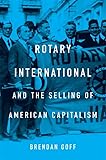Rotary International and the Selling of American Capitalism / Brendan Goff.
Material type: TextPublisher: Cambridge, MA : Harvard University Press, [2021]Copyright date: ©2021Description: 1 online resource (320 p.)Content type:
TextPublisher: Cambridge, MA : Harvard University Press, [2021]Copyright date: ©2021Description: 1 online resource (320 p.)Content type: - 9780674989795
- 9780674259126
- Business networks
- Capitalism
- Economics -- Sociological aspects
- Humanitarianism
- Publicity
- HISTORY / United States / 20th Century
- Chicago
- Civic internationalism
- Cuba
- Havana
- Japan
- Jim Davidson
- League of Nations
- Lillian Davidson
- Rotary International British Isles (RIBI)
- Rotary International
- Rotary club
- Service club
- Tokyo
- United Nations
- Wichita
- Wilsonianism
- 369.5/20973 23
- HF5001.R79 G64 2021
- online - DeGruyter
| Item type | Current library | Call number | URL | Status | Notes | Barcode | |
|---|---|---|---|---|---|---|---|
 eBook
eBook
|
Biblioteca "Angelicum" Pont. Univ. S.Tommaso d'Aquino Nuvola online | online - DeGruyter (Browse shelf(Opens below)) | Online access | Not for loan (Accesso limitato) | Accesso per gli utenti autorizzati / Access for authorized users | (dgr)9780674259126 |
Frontmatter -- CONTENTS -- Introduction The Civic Internationalism of Main Street -- 1 Cooperation among Gentlemen Main Street Meets the World -- 2 No Foreigners Allowed The World Meets Main Street -- 3 The Elimination of Differences Main Street Meets Tokyo -- 4 Through Earthquake and Fire Tokyo Meets Main Street -- 5 Under the Shadow of Rotary When Main Streets Compete -- 6 Trailing along through Asia Main Street Comes Full Circle -- Conclusion From Here On! -- Notes -- Acknowledgments -- Index
restricted access online access with authorization star
http://purl.org/coar/access_right/c_16ec
A new history of Rotary International shows how the organization reinforced capitalist values and cultural practices at home and tried to remake the world in the idealized image of Main Street America. Rotary International was born in Chicago in 1905. By the time World War II was over, the organization had made good on its promise to “girdle the globe.” Rotary International and the Selling of American Capitalism explores the meteoric rise of a local service club that brought missionary zeal to the spread of American-style economics and civic ideals. Brendan Goff traces Rotary’s ideological roots to the business progressivism and cultural internationalism of the United States in the early twentieth century. The key idea was that community service was intrinsic to a capitalist way of life. The tone of “service above self” was often religious, but, as Rotary looked abroad, it embraced Woodrow Wilson’s secular message of collective security and international cooperation: civic internationalism was the businessman’s version of the Christian imperial civilizing mission, performed outside the state apparatus. The target of this mission was both domestic and global. The Rotarian, the organization’s publication, encouraged Americans to see the world as friendly to Main Street values, and Rotary worked with US corporations to export those values. Case studies of Rotary activities in Tokyo and Havana show the group paving the way for encroachments of US power—economic, political, and cultural—during the interwar years. Rotary’s evangelism on behalf of market-friendly philanthropy and volunteerism reflected a genuine belief in peacemaking through the world’s “parliament of businessmen.” But, as Goff makes clear, Rotary also reinforced American power and interests, demonstrating the tension at the core of US-led internationalism.
Mode of access: Internet via World Wide Web.
In English.
Description based on online resource; title from PDF title page (publisher's Web site, viewed 01. Dez 2022)


